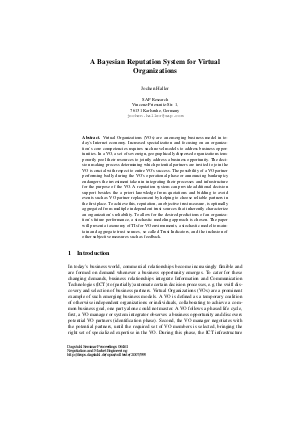A Bayesian Reputation System for Virtual Organizations
Author Jochen Haller
-
Part of:
Volume:
Dagstuhl Seminar Proceedings, Volume 6461
Part of: Series: Dagstuhl Seminar Proceedings (DagSemProc) - License:
 Creative Commons Attribution 4.0 International license
Creative Commons Attribution 4.0 International license
- Publication Date: 2007-05-10
File

PDF
DagSemProc.06461.3.pdf
- Filesize: 180 kB
- 8 pages
Document Identifiers
Subject Classification
Keywords
- Reputation system
- bayes network
- trust management
- virtual organisations
Metrics
- Access Statistics
-
Total Accesses (updated on a weekly basis)
0PDF Downloads0Metadata Views
Abstract
Virtual Organizations (VOs) are an emerging business model in today’s Internet economy. Increased specialization and focusing on an organization’s core competencies requires such novel models to address business opportunities. In a VO, a set of sovereign, geographically dispersed organizations temporarily pool their resources to jointly address a business opportunity. A VO follows a phased lifecycle where speed is an essential requirement, especially in the initial identification and formation phases that deal with potential VO partner identification and selection. For instance a business opportunity in the form of a government issued tender in the collaborative engineering application domain to upgrade a passenger plane needs to be swiftly answered within a defined deadline. VO management tasks such as VO formation, partner selection and dismissal are duties of the VO manager role, in collaborative engineering typically performed by a system’s integrator. The VO manager’s final decision making which potential partners are invited to join the VO is crucial with respect to entire VO’s success. The possibility of a VO partner performing badly during the VO’s operational phase or announcing bankruptcy endangers the investment taken in integrating their processes and infrastructure for the purpose of the VO. A reputation system can provide additional decision support besides the a priori knowledge from quotations and bidding to avoid events such as VO partner replacement by helping to choose reliable partners in the first place. To achieve this, reputation, an objective trust measure, should be aggregated from multiple independent trust sources, inherently characterizing an organization’s reliability, so-called Trust Indicators (TIs). Such TIs can provide measurable trust values about an organization from heterogeneous domains, e.g. timely delivery of service, organizational stability or environmental risks due to building locations. To allow for the desired predictions of an organization’s future performance, a stochastic modeling approach is chosen. The talk will present: 1) a taxonomy of TIs for VO environments 2) a stochastic model to maintain TIs and their aggregation using Bayes networks 3) the inclusion of other subjective measures such as feedback
Cite As Get BibTex
Jochen Haller. A Bayesian Reputation System for Virtual Organizations. In Negotiation and Market Engineering. Dagstuhl Seminar Proceedings, Volume 6461, pp. 1-8, Schloss Dagstuhl – Leibniz-Zentrum für Informatik (2007)
https://doi.org/10.4230/DagSemProc.06461.3
BibTex
@InProceedings{haller:DagSemProc.06461.3,
author = {Haller, Jochen},
title = {{A Bayesian Reputation System for Virtual Organizations}},
booktitle = {Negotiation and Market Engineering},
pages = {1--8},
series = {Dagstuhl Seminar Proceedings (DagSemProc)},
ISSN = {1862-4405},
year = {2007},
volume = {6461},
editor = {Nick Jennings and Gregory Kersten and Axel Ockenfels and Christof Weinhardt},
publisher = {Schloss Dagstuhl -- Leibniz-Zentrum f{\"u}r Informatik},
address = {Dagstuhl, Germany},
URL = {https://drops.dagstuhl.de/entities/document/10.4230/DagSemProc.06461.3},
URN = {urn:nbn:de:0030-drops-9995},
doi = {10.4230/DagSemProc.06461.3},
annote = {Keywords: Reputation system, bayes network, trust management, virtual organisations}
}
